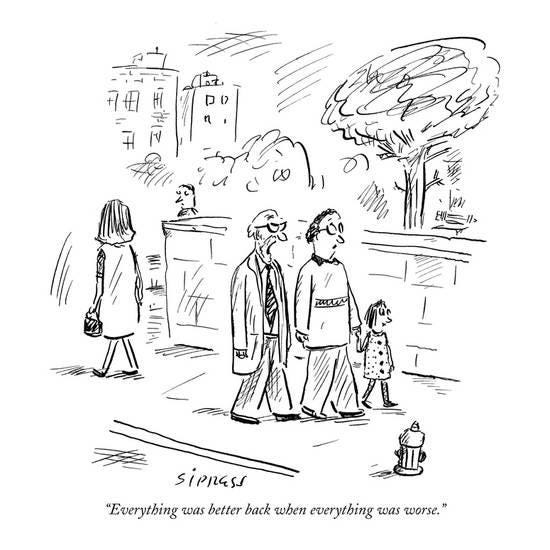Last week, my sister came to visit. It was awesome. We saw Mike Shinoda, got ice cream, and tried lots of great food. I love her and I’m glad we hung out.
But for some reason, whenever I go to an event, a friend stops by, or the week is just generally slow, I still feel like I should get as much done as I usually do. Like I should create the same output, regardless of the time I take off.
That’s impossible, of course. But it creates guilt and that guilt is the real problem. Guilt is a useful emotion. As opposed to shame, it makes us want to step up. To rectify what we did wrong.
But when it comes to being productive, there’s nothing to rectify. It’s not like a crooked picture you can just push back into place. Your life is continuous and each moment is a small dot on a long line. Work is such a big part of that line that it’s impossible to see how each dot shapes it day-to-day, week-to-week, often even year-to-year. Unlike other things we feel guilty about, you can’t just go back to the café, pay the bill you forgot, and reset the karma balance to zero. Because there’s always more work.
And so it may feel like focusing for one hour in the evening makes up for a bad day, but who wants to spend their entire life salvaging leftover scraps of time? That’s a surefire recipe for unhappiness. The solution lies on a higher level.
Who’s to say it was a bad day in the first place? Maybe you needed rest. Maybe you were affected by something in your subconscious. Why can’t we suspend that judgment altogether? Jim Carrey has a great metaphor for our moods:
“I have sadness and joy and elation and satisfaction and gratitude beyond belief, but all of it is weather. And it just spins around the planet.”
Shame, guilt, regret, these are also just weather phenomena. External conditions that’ll sometimes swing by your planet.
Of course, it’s hard to constantly practice this non-judgment in advance. To go into each experience without attachment or expectation. We’re human, after all. We fail. We let things get to us. And so we need to learn to pick ourselves back up. To realize when we’re complaining about the weather and stop.
The only way to do this over and over again, to keep moving forward no matter what happens, is to relentlessly forgive yourself. Forever and for everything. You won’t always do it immediately, but try to do it eventually.
Note that forgiving yourself is not about letting yourself off the hook. It’s not an excuse to not learn from your mistakes. It won’t guarantee it either, but without forgiveness, you can’t learn anything. Because regret is in the way. You must say: “Okay, that’s done, how will I move on and what will I change?”
This applies to all kinds of emotional weather you’ll experience, but when it comes to productivity, to using your time well, it’s especially important. Only forgiveness can remove the friction of guilt. The nagging that prevents you from picking up the pen again. From continuing to just do things.
We all have different definitions of success and that’s a good thing. For some, it’s raising their kids to exceed their own accomplishments. For others, it’s fighting for a cause or using art to change how we think. And some just want to live quietly and enjoy the little things.
But no matter what end work serves in your life, you’ll never do enough of it if you constantly kick yourself.
Forgiveness is the only way.
Why don’t we talk about this? When we’re looking for ways to move on, why do we encourage everything from resting to trying hard to having a purpose to proving someone wrong, but not loving yourself when all of these fail?
I don’t know. Maybe, it makes us feel like frauds. To say “alright, let’s move on,” when others had to pay stricter consequences. Maybe, forgiveness isn’t sexy enough. Not a compelling reason to continue. Or, maybe, it’s the hardest of them all to believe in. To actually mean it when you think it. Or say it.
I’d put my money on that last one.
It’s good to practice non-judgment. It helps me a lot every time I succeed. But often, I don’t. And then I’m wrestling with myself for forgiveness. I’d much rather learn to consistently win that second battle. The first one isn’t lost, but I know I’ll never reach perfection. Forgiveness, however, is always available.
It’s as if the healthiest option is right in front of us, but we’re too blind or stubborn to use it. Too scared to allow ourselves to move on. Well, I don’t know you, but here’s permission to forgive yourself. I hope you’ll exercise it. It’s time. Have courage. Move on. Turn the page. And don’t look back.
Maybe, life is not about finding the straightest path to success. Or the simplest. Or even the smoothest. Maybe, it’s about finding one, just one, that allows you to get there at all. But that requires letting go of our old beliefs.
Mike Shinoda is a lead member of Linkin Park. On his current record, he’s processing the loss of his best friend and band mate of 20 years. Imagine how much forgiveness that takes. It’s got sad songs, angry songs, desperate songs, helpless songs. But there’s also one that’s light. Optimistic. Forgiving.
Maybe, in our own quest for being kinder to ourselves, all we have to do is act on its lyrics:
And they’ll tell you I don’t care anymore
And I hope you’ll know that’s a lie
’Cause I’ve found what I have been waiting for
But to get there means crossing a line
So I’m crossing a line





